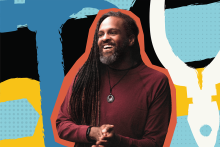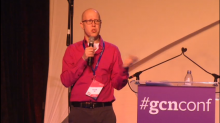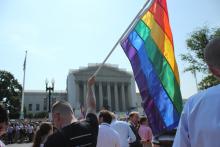Justin Lee

I’ve noticed that a lot of the resources that exist for facilitating relationships across disagreement are geared toward the non-affirming: “How should Christian parents respond if one of their children comes out as gay?” “Can Christian parents point their gay children to Jesus?” “Responding to a ‘Gay Christian’ in the Family.” And while many LGBTQ+ people don’t want close relationship with non-affirming family, those of us who do want those relationships, don’t want to sacrifice our safety. Darren Calhoun has spent two decades working to build bridges that protect the dignity and safety of all parties, including LGBTQ+ people and their non-affirming community.

Sixteen years ago as a college student at Wake Forest University, Justin Lee created a website for LGBT Christians with the goal of creating a small online community. Now, the Gay Christian Network is a cornerstone organization in the LGBT Christian community. Its annual conference is credited as the largest gathering of LGBT Christians, many of whom have found a home within the community the organization has fostered. On July 20, the organization and Lee parted ways, saying in a joint statement that they “have come to realize they have differing perspectives on the operational needs of the ministry."

Less than 10 weeks after Houston voters — many persuaded by local Christian pastors — repealed a city ordinance that would have protected Houstonians from discrimination on the basis of sex, sexual orientation, and gender identity (as well as race, religion, and other traits), 1,450 people gathered in the city for the Gay Christian Network conference, the world’s largest annual event for LGBT Christians and their allies.

On Feb. 21, Time.com broke the news that my evangelical publisher, Destiny Image, dropped a book contract it had made with me almost a year ago because its buyers refused to sell my book due to my pro-LGBTQ activism.
Many conservative evangelicals have called my pro-LGBTQ stance “deplorable” and labeled me a false teacher. Other progressives have uplifted my story as one that demonstrates the discrimination that too many conservative Christians have become known for. In all of this coverage, both positive and negative, though, the true message of my situation has gotten lost.
Sure, my publisher dropped my book contract. Sure, evangelical booksellers seem to have blacklisted me and refuse to sell my evangelical book in evangelical bookstores — a too-close-to-home example of the evangelical discrimination against the LGBTQ community and our allies.
But at the heart of this controversy, there’s a deeper problem: a fundamentally flawed belief that one cannot be a true Christian if one identifies as LGBTQ (or an ally of LGBTQ people).

Ten years after Massachusetts became the first state to allow same-sex marriage, gay and lesbian Americans can be wed in 35 states and the District of Columbia (Florida will boost that number to 36, starting Jan. 6). This year, the Supreme Court may put an end to the skirmish by legalizing what progressives call “equality” and conservatives dub a “redefinition” of this cherished social institution.
The court last ruled on gay marriage in 2013 when the justices gutted much of the federal Defense of Marriage Act in United States v. Windsor and delivered a massive blow to anti-gay marriage advocates. Since then, the court has acted by not acting — in effect, doubling the number of states where gay marriage is legal, from 17 to 35, by refusing to hear a slew of appeals last year.
In November, the Cincinnati-based 6th U.S. Circuit Court of Appeals upheld gay marriage bans in four states, which will almost certainly require the high court to decide the issue once and for all.
Conservative Christians have been among the most ardent opponents of gay marriage and rights for decades. How will they respond if the Supreme Court makes gay marriage legal nationwide?
The answer, it turns out, depends on which Christian you’re speaking to.

When Southern Baptists convened a national conference in Nashville, Tenn., this week to discuss issues of human sexuality, bringing conservative evangelicals and LGBT Christian activists into the same ballroom was a recipe ripe for potential fireworks.
Perhaps the most shocking thing was how few fireworks there were.
The Southern Baptist Convention’s Ethics and Religious Liberty Commission was clear: Sex is reserved between a man and a woman within the bonds in marriage. And openly gay evangelicals in attendance were equally clear: Homosexuality is not incompatible with Christianity.
No concessions were made, but leaders on both sides expressed surprise at how the two agreed to coexist. Put another way: The old emphasis on “Love the sinner, hate the sin” has become more a version of simply “Love all sinners. Ask questions later.”
“I do want to apologize to the gay and lesbian community on behalf of my community and me for not standing up against abuse and discrimination directed towards you. That was wrong and we need your forgiveness,” said North Carolina megachurch pastor J.D. Greear, drawing applause.
“We have to love our gay neighbor more than our position on sexual morality.”